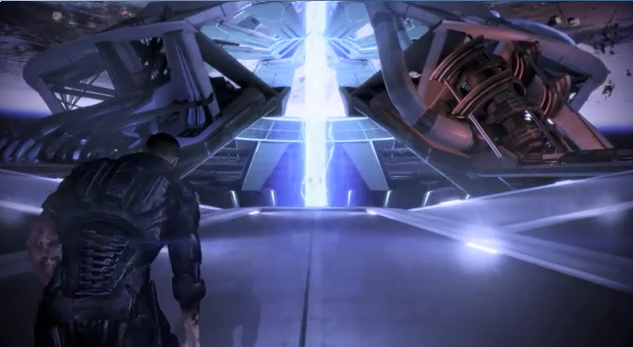This post has not been edited by the GamesBeat staff. Opinions by GamesBeat community writers do not necessarily reflect those of the staff.

This article contains spoilers for Mass Effect 3.
I don’t want a downloadable extended cut of the Mass Effect 3 ending.
I didn’t join the angry mob wielding flaming torches of text who ignited every message board with vengeful vitriol. Nor did I support the ironic bakers who sent BioWare a batch of endgame-inspired, color-coded cupcakes.
I didn’t publicly emote my disappointment with the conclusion to Commander Shepard’s story arc.
No…I joined the group that quietly hoped for those final moments to be nothing but a bad dream.
And you know what? I believe that’s exactly what Mass Effect 3’s ending was: a dream.
Rather, I think it was an indoctrination-induced nightmare.
All those wacky inconsistencies, exploding mass relays, and out-of-the-blue jungle planet hijinks were a ruse. And we fell for it…hook, line, and Citadel.
We were indoctrinated, just like Shepard — and just like BioWare intended.
That's why I believe the Mass Effect trilogy’s meta-ending is one of the most (potentially) brilliant crescendos to not only a video game but also to a piece of entertainment. Period.
Yeah, I’m one of those Indoctrination Theory (IT) sympathizers — tinfoil hat and all. If you don’t know what I’m talking about, the theory states that the series’ everlasting antagonists, the reapers, attempted to indoctrinate the player-controlled commander during the final battle in Mass Effect 3. So, in this hypothesis, all those happenings on the Citadel occurred inside Shepard’s patched-up skull.
Sounds crazy, right? Well, BioWare filled the final 20 minutes of ME3 with cleverly placed clues — along with some old-fashioned symbolism — pointing to the plausibility of IT. If you don’t believe me, do a simple web search to see what I’m talking about. The evidence is as clear as the water from a Presidium pond.

Many fans disagree with the indoctrination angle. These individuals think BioWare went out of its way to craft a completely nonsensical denouement to Shepard’s space opera. They cite bad writing and negligence as reasons for their intense displeasure. And, unfortunately, the Extended Cut was hastily assembled for just those folks — the ones who are not in the IT crowd.
Which is why I’m concerned.
With today’s patch-it-first-ask-questions-later ecosystem, the ME3 ending never had a chance to truly click with the community. Even worse, instead of getting a playable epilogue where we could wake up and finish the fight (which BioWare should have included in the original game, I know), we’re getting some added cutscenes for the last act — not even four months removed from the release of the title.
Do I want closure? Of course. Do I want to learn the fate of my crew? Definitely. Do I want to build a house on Rannoch for Tali’Zorah where we could live happily ever after? You bet your bosh’tet I do.
But we didn’t get that the first time, and I hope we don’t get that with this new content.
The Indoctrination Theory is just that — a theory. And it developed because some fans dug deeper into the story instead of digging into BioWare. The most iconic fictional franchises make you think — sometimes through controversy. Mass Effect is part of that hallowed fraternity. I don’t want an update to take away the intrigue of the current finale or change its implied purpose.
BioWare caved in from the pressure, and I’m worried that the ending, like Shepard, will be caught in the rubble — or the rabble.
